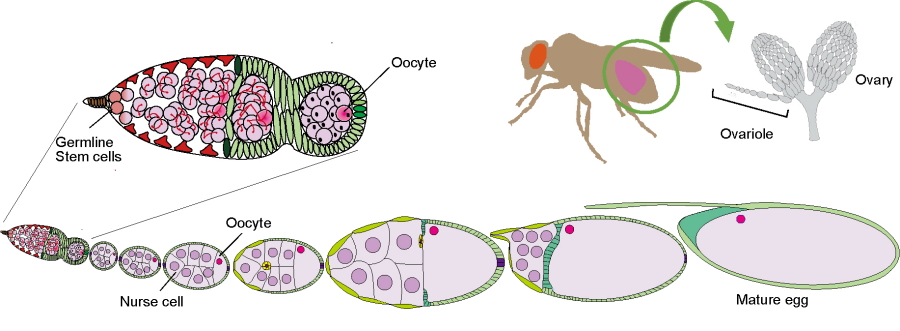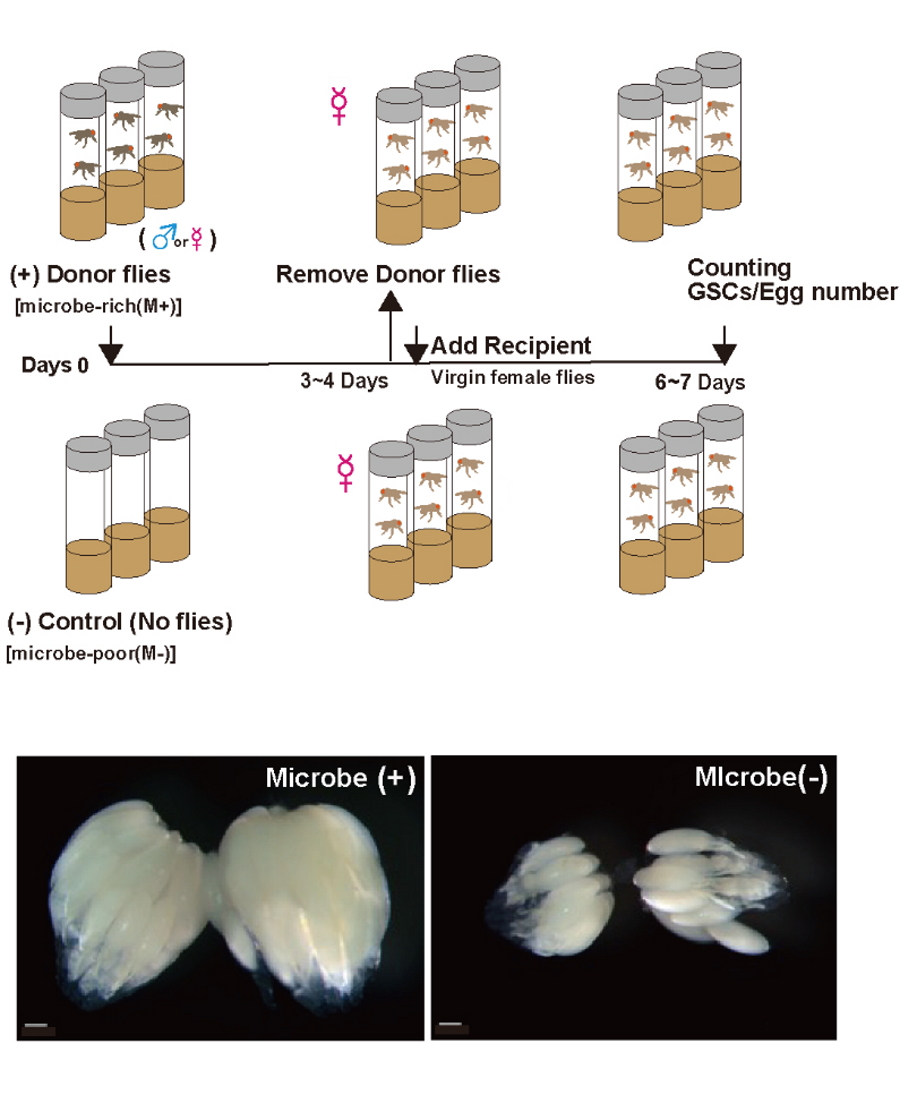Microbes control Drosophila germline stem cell increase and egg maturation through hormonal pathways
| Journal | Commun. Biol. (2023) |
|---|---|
| Title | Microbes control Drosophila germline stem cell increase and egg maturation through hormonal pathways |
| Laboratory | Germline Biology Group〈Prof. KAI Toshie〉 |
For many of us, when we think of microbiomes, our first thoughts are probably about the beneficial microorganisms that live in our guts. But now, researchers from Japan and US have discovered how the microbes living in fruit flies can enhance their reproduction.
In a recently published study in Communications Biology, the research group has revealed that microbes in the fruit fly microbiome are involved in controlling the germline stem cells that form eggs, as well as subsequent egg maturation, in female fruit flies.
The microbiome—the community of microorganisms that live together in and on a host—has a huge role in facilitating functions that are necessary for survival. This includes metabolic regulation, intake of nutrients, and reproduction, including improving fertility in conditions of inadequate nutrition. However, the specific molecular mechanisms enabling microbes to control the maturation of the germline (the lineage of cells within an organism that gives rise to eggs and sperms) are still a mystery.
"We propose that microbes control various stages of oogenesis, which leads the production of eggs in the ovary," says lead author of the study Ritsuko Suyama. "They may do this by modifying hormone levels and their successive pathways and can therefore promote host fertility in conditions of poor nutrition."
The researchers investigated the effects of microbes on oogenesis in fruit flies, Drosophila melanogaster. Using genetic analysis, the team revealed that microbes boost oogenesis by both accelerating the division of ovarian cells and suppressing programmed cell death, as well as increasing the production of germline stem cells (GSC) by enhanced cell division and eventually increasing the number of mature eggs in females. "We discovered that the microbes’ enhancement of reproductive function was controlled by the activation of the hormonal pathways for ecdysone and juvenile hormones in the germline stem cells—the cells that develop into eggs," explains Toshie Kai, senior author.
Ecdysone is a steroid hormone that regulates moulting in insects. The researchers found that the ecdysone pathway may be an important mediator for a microbe-induced increase of GSCs and egg maturation. Meanwhile, the juvenile hormone pathway is involved only in GSC proliferation, which indicates that the hormonal pathways are activated during different stages of oogenesis.
"Our results show that environmental microbes can improve host reproduction by controlling hormone release and increasing oogenesis in their hosts," says Suyama.
These new discoveries about host-microbe interactions could present new avenues for improvements in reproductive health, for example via new treatments involving probiotics. Specifically, the findings from this study will contribute to the understanding of how microbes boost their host’s reproductive processes, which will open the door for new methods to improve fertility and infertility treatment.
Abstract
Reproduction is highly dependent on environmental and physiological factors including nutrition, mating stimuli and microbes. Among these factors, microbes facilitate vital functions for host animals such as nutritional intake, metabolic regulation, and enhancing fertility under poor nutrition conditions. However, detailed molecular mechanisms by which microbes control germline maturation, leading to reproduction, remain largely unknown. In this study, we show that environmental microbes exert a beneficial effect on Drosophila oogenesis by promoting germline stem cell (GSC) proliferation and subsequent egg maturation via acceleration of ovarian cell division and suppression of apoptosis. Moreover, insulin-related signaling is not required; rather, the ecdysone pathway is necessary for microbe-induced increase of GSCs and promotion of egg maturation, while juvenile hormone contributes only to increasing GSC numbers, suggesting that hormonal pathways are activated at different stages of oogenesis. Our findings reveal that environmental microbes can enhance host reproductivity by modulating host hormone release and promoting oogenesis.

Fig. 1
Drosophila oogenesis process

Fig. 2
Experimental system of the oogenesis development by the microflora as an environmental factor. Ovaries are more prominent and mature eggs increase in a microbial environment.

Fig. 3
Molecular pathways for germline stem cell proliferation under microbe-rich environment
| Authors | Ritsuko Suyama (1), Nicolas Cetraro (2), Joanne Y. Yew (2), Toshie Kai (1)
|
|---|
